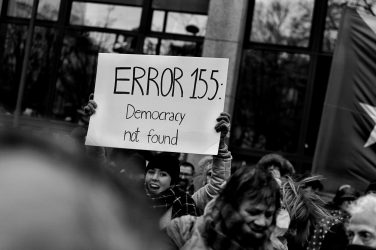Last week Jair Bolsonaro became Brazil’s 38th president, Natalia Carrusca and Fernando Burgés explore the global implications of a far-right leader coming into power
The result of last week’s presidential election in Brazil has made the front-page of newspapers around the world. Far-right parliamentarian Jair Bolsonaro was chosen with 55,13% of valid votes to become the 38th president of the biggest country in Latin America, after conducting his campaign based on a nakedly fascist discourse. On the same day, thousands of people filled the streets of Brazil with chants that glorified the self- proclaimed homophobic and blatantly racist and misogynist politician, an “admirer” of the military dictatorship that took power in the country in 1964 and, for two decades, persecuted, tortured and killed political activists and human rights defenders.
In the wake of Bolsonaro’s victory – whom his supporters call “the legend” – gunshots could be heard in a number of Brazilian cities alluding to the president-elect’s promise to liberalise firearm laws. This measure, he says, together with giving the police a broader license to kill, will be the antidote for the outstanding violence levels in the country. In the city of Niteroi, uniformed and armed military men atop their vehicles shamelessly celebrated the results, parading before a frantic crowd.
In the 80s, after two decades under a military dictatorship, Brazil saw the drafting of a new and democratic federal constitution. At the same time, however, the perpetrators of the many horrific crimes of the regime were never held accountable, immunised by an amnesty deal with the blessing of Brazil’s opportunistic political and economic elite. There is no doubt that the memory of those who fought for freedom, those who, power sought to silence in those dark times, was never duly honoured and could not truly find its rightful place in the national collective imaginary. In the period that preceded this presidential election, it was not unusual to hear supporters of Bolsonaro who stated that Brazil has never been under any dictatorial government, or that the military dictatorship never promoted any censorship or persecution, displaying a horrendous lack of any historical understanding. As French politician Yannick Vaugrenard once said, “to refuse to accept the lessons that history has taught us by denying its events means running the risk of being condemned to relive those events”.

Inside out: Bolsonaro seen by the international community
The furor and the acclamation around Bolsonaro’s anti-human rights and anti-democratic discourse stand side by side with Duterte’s ruthless “war against drugs” and crackdown on human rights defenders in the Philippines, with Orbán’s institutionalisation of xenophobia and persecution of civil society organisations in Hungary and with Trump’s manufactured security and immigration crises in the US.
These are only the most aberrant signs of the catastrophic growing trend of hate speech and violence that has stoutly swept the globe. This is so much more than an “interesting” political and sociological phenomenon, we are talking about real threats being posed, ever more frequently, to the lives of those who dare to speak out for tolerance, peace, and democracy. In many places, the situation is no longer a warning about a distant danger that slowly approaches, but the realisation of an announced disaster.
The number of good articles trying to explain the phenomenon Bolsonaro across the world media has been prolific. Le Figaro and the Guardian have done a particularly good job in the coverage of the Brazilian tragedy. Some of the nuances of the political moment in Brazil, however, might have been lost to non-Portuguese speakers following the events. We, Brazilians living abroad, have had a hard time trying to explain to people of other nationalities two important elements in the context of these elections: firstly, the sinister wave of “alternative facts” that shrouded the country in a medieval fog of urban legends, lies and conspiracy theories – in the Brazil of 2018, facts and fiction both weigh the same, boiling down to simply a matter of choice. Secondly, the fact that the term “Human Rights” has been ruthlessly put under siege by the right-wing. They succeeded in twisting it to the point that, now, the concept has earned a pejorative connotation, being attributed to those who Bolsonaro’s fans derogatorily call “communists” and whose only goal is to protect “bandits”.
The real watershed in Brazilian history, thus, is not merely political. The process that led to the election of the far-right marks the erosion of the irrefutability of facts as basis for rational arguments and, at the same time, shattered the legitimacy of humanity’s greatest civilizational achievement of the modern times: the human rights declaration.
Why Brazil’s problem is a global issue?
From the EU’s perspective, Brazil is too big to walk away. It was one of the first countries to establish diplomatic relations with the EU, in the 1960s. In 2007, the EU recognised Brazil as one of its key global partners through the establishment of the formal EU-Brazil Strategic Partnership, which covers areas such as climate change; sustainable energy; the fight against poverty; the Mercosur integration process and stability and prosperity in Latin America. When it comes to trade, the figures are massive: Brazil’s trade with the EU accounts for 33.6 % of the EU’s total trade with the Latin American region (2014); Brazil is the EU’s 10th largest trading partner and is the single biggest exporter of agricultural products to the EU.
Beyond political and economic prospects that should be alarming to Brussels, Brazil’s importance to Europe and the world is based on the fact that the country holds most of the largest tropical rain forest in the world, famed for its biodiversity. Bolsonaro considers closing environmental agencies tasked with forest protection and opening-up indigenous territories to mining and agribusiness. Even the Paris Agreement is on his radar. Given his track record, we have enough reasons to believe he will indeed pursue anti-indigenous and anti-environmental policies, with global consequences.

Building Democratic Resistance
Even though Bolsonaro, his staff and followers resorted to a series of low-blow tactics to win, the final numbers in the polls show the obvious: there was no one else able to gather enough votes to beat him at this time. Therefore, acknowledging defeat is the first moral obligation of every Brazilian who didn’t vote for him – the majority, in fact. Being defeated by a candidate with fascist inclinations means that not only the left and the centre have failed too much in what they have done so far, but also that the entire democracy project has failed miserably.
The second step for those willing to build democratic resistance against Bolsonaro is to withstand the temptation of “sponsoring” the division of the population. Brazil is so strongly divided today that it is hard to imagine it changing soon. However, the only chance to change the political tragedy that has unfolded is by de-escalating the binary mindset, not to reinforce it. The left must lay out an inclusive strategy aiming to slowly absorb its opponents, instead of launching a hate campaign against them.
Thirdly, opposition must reinvent the struggle. Traditional means are over and no longer have the strength to counter the growing far-right trend. Classic leftist revolutionaries should agree that Gramsci’s strategies to contest hegemonic norms of legitimacy are, in the digital age, obsolete if they’re not fully updated and revitalised.
Finally, and most importantly, the resistance must fight the nationalist rhetoric. As in a cake recipe, building a fascist-like state requires some basic ingredients such as finding a scapegoat, spreading hate speech and creating a cult to personality. Nationalism is the baking powder in this cake, without which it could never grow. To spoil the plans of those wishing to shift Brazil’s democracy into a military state, the struggle starts with trying to de-escalate the glorification of the very state. The loyalty of the Brazilian people should not be hijacked by a strong-man. Instead, the population should unite to fight the real enemy of the country: inequality.
Caetano Veloso, one of the artists and intellectuals persecuted by the military regime decades ago, recently wrote an article entitled “Dark times are coming for my country” for the New York Times. The millions of Brazilians for whom democracy and human rights are non-negotiable certainly agree with Caetano. For those who oppose Bolsonaro and everything he represents, one thing is clear: they may have wept, and their hopes may have been vanquished by fear, but they will not give-up without resistance. It is true that the unprecedented political polarization in the country builds upon moral stands so radically contrasting that it is hard to glimpse reconciliation any time soon. But for the survival of democracy, all efforts are desperately needed.
Cover photo: Voters of candidate Jair Bolsonaro meet at Windmills Park; Editorial J, CC BY-ND 2.0 (Flickr)





